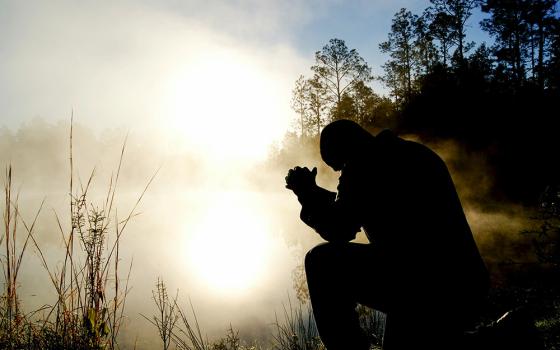
Italian Cardinal Domenico Bartolucci directs a choir in St. Peter's Basilica at the Vatican in this May 15, 2011, image from video. (CNS/Paul Haring)
Italian Cardinal Domenico Bartolucci, who had devoted most of his priestly life to music and served as director of the Sistine Chapel Choir for more than 40 years, died Monday at the age of 96.
In a telegram of condolence to Bartolucci's family and friends, Pope Francis described him as a "dear and esteemed priest, illustrious composer and musician, who exercised his long ministry particularly through sacred music, which is born of faith and expresses faith."
The pope said Bartolucci valued and promoted polyphony, "aimed at elevating the heart in praise of God."
Cardinal Angelo Sodano, dean of the College of Cardinals, is scheduled to preside over Cardinal Bartolucci's funeral Wednesday in St. Peter's Basilica. Pope Francis is to join mourners at the end of Mass and preside over the final commendation.
Bartolucci retired from the Sistine Chapel post in 1997, but he continued composing music, including "Benedictus," a piece written and performed in 2011 for retired Pope Benedict XVI, who had named him to the College of Cardinals a year earlier.
Already a student of music and an assistant choir director, he was ordained to the priesthood in 1939 and the same year earned a diploma in composition and orchestra direction from the Florence Conservatory of Music. In 1942, he went to Rome to refine his knowledge of sacred music and soon was helping direct the choir at the Basilica of St. John Lateran.
After a brief term as a parish priest near Florence, he was called back to Rome to serve as choir director at the Basilica of St. Mary Major and to teach composition at the Pontifical Institute for Sacred Music. In 1952, he became the assistant director of the Sistine Chapel Choir.
Appointed director of the choir by Pope Pius XII in 1956, he reorganized its musical program, formed the Sistine Chapel boys' choir, took the group on the road to give concerts around the world, and continued composing works for both choir and orchestra.
His death leaves the College of Cardinals with 200 members, 109 of whom are under the age of 80 and therefore eligible to vote in a conclave.


